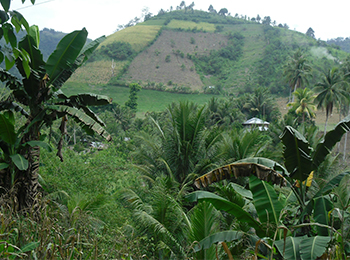About 1 result/s
-
Volume 5, Issue 1, August 2023
The Philippines is highly exposed and vulnerable to tropical cyclones (also known as typhoons), which caused over ₱352 billion worth of losses and damages to agriculture between 2000 and 2021. The study focuses on the impacts of typhoons on banana production in the Philippines. Bananas are a crucial crop for consumption, nutrition and the economy. Mindanao accounts for a majority of the country’s production. The study examines the physical sensitivity of bananas to hazards like typhoons, considering factors such as wind speed, flood-prone areas, and slope, using geographical methods.

-
Volume 4, Issue 1, April 2021
This study assessed the climate trends, changes, impacts, and adaptation strategies of farm households in five barangays in the Roxas mountain range, Koronadal City, South Cotabato by using household survey data from 265 respondents, and complimented with focus group discussions, and key informant interviews. The findings of the study revealed that climate changes are manifested by floods, landslides, and droughts as experienced by the local people which caused devastation and affected socioeconomic and environmental conditions of farming livelihood. Farmers used to have bountiful harvests, however, this situation recently changed due to the increasing climate-related risk events. The existing adaptation strategies are just stop-gap solutions that address the effects of climate change, but do not consider the root causes. To consider future changes in climate patterns, the socioeconomic and political structure and processes of the communities need to change by addressing multifaceted drivers of climate change hazards and their impacts. Some grassroot-level transformative adaptation strategies identified in the study consisted of socioeconomic facets, specifically, investment in children’s education, financial management, family planning, and development of alternative on-farm and nonfarm livelihood options. The environmental aspect, including the promotion of agroforestry system, water impoundment technologies, and advanced early warning system, were also considered.

-
Volume 4, Issue 1, January 2021
The Philippines is one of the countries
highly vulnerable to climate change, and this condition threatens further the meager
agricultural production in the country. However, while the Philippines has
established the institutional foundations linking climate change to agriculture,
through policies and legislation, advances in climate change adaptation have
been slow, especially at the local level. This paper demonstrated that this gap
in policy formulation and actual implementation stems from the lack of institutional
analysis in CCA efforts in the Philippines. The paper concludes that along with
the scientific and technological discussions, institutional conversations
should be among the initial vital steps in CCA planning, and policy and
decision-making. It further advocates that institutional analysis can be the
entry point for designing reforms toward effective CCA implementation.

-
Volume 3, Issue 1, December 2018
Only few studies investigated the adaptive capacity or
adaptation practices of indigenous peoples (IPs) in the Philippines and none so
far in the Compostela Valley. Since the landslide and flash flood events in
2012 brought by Typhoon Bopha, no systematic study has been conducted to
compare the adaptive capacity of IPs and non-IPs in New Bataan’s most affected
communities. This paper contributes to the assessments of adaptive behavior
with the ultimate goal of stimulating adaptation support to the most vulnerable
people.
-
Volume 3, Issue 1, August 2018
Typhoon Pablo (Bopha) was the most powerful storm to have hit the island of Mindanao, southern Philippines in more than 100 years of recorded storms. This paper identified the adaptation gaps in the post-Typhoon Bopha recovery and reconstruction based on roundtable discussion, household survey and conjoint analysis.
-
Volume 2, Issue 1, November 2016
The mental models approach has been put forward as a method for investigating laypeople’s knowledge, beliefs, and perception as precursor to the development of risk communication messages and strategies. Using means-ends analysis, the paper assessed the adaptability of the mental models approach to the development of risk communication messages on climate change for rice farmers in a village in the province of Pangasinan.
-
Volume 2, Issue 1, November 2016
Lately, the humanitarian community has been utilizing crowdsourcing to facilitate medical and disaster response. Grounded in Geiger et al.’s (2011) Crowdsourcing Information Systems (CIS) and Suroweicki’s (2004) Wisdom of the Crowds (WC), this study content-analyzed 23 humanitarian crowdsourcing websites to find out how crowdsourcing has enabled medical and disaster response, as evident in global humanitarian movements from 2010 to 2014.